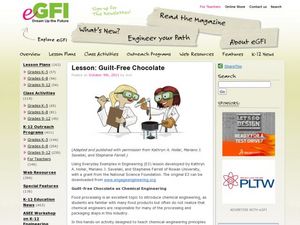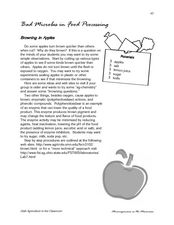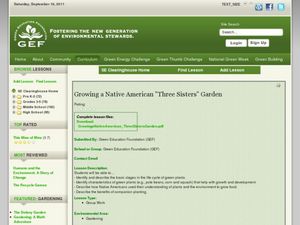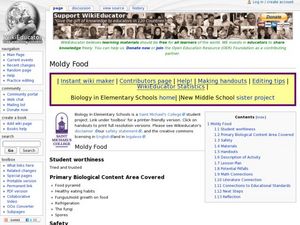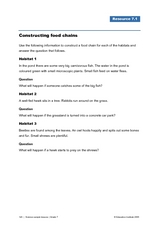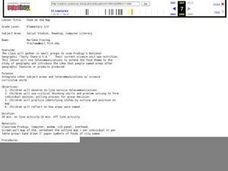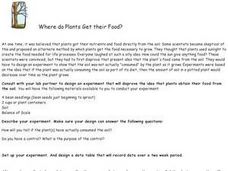Curated OER
Lesson: Guilt-Free Chocolate
Experiment with chocolate coating on cookies! What a delightful way to learn about food processing and chemical engineering. Throughout this activity, groups collect measurements and make calculations. They conclude by writing...
Baylor College
Food Webs
Explore various ecosystems from around the world as your class discovers the interdependence of all living things. Using the provided sets of ecosystem cards, young scientists work in small groups building food webs to demonstrate the...
Baylor College
What's That Food?
Get things cooking with the first lesson plan in this series on the science of food. Working in small groups, young scientists make and record observations about different mystery foods. These descriptions are then shared with the class...
Curated OER
Food for Spaceflight
When astronauts get hungry in outer space, they can't just call and have a pizza delivered. In order to gain an appreciation for the challenges associated with space travel, young learners are given the task of selecting, testing, and...
Curated OER
Bad Microbes in Food Processing
Students complete an experiment to determine if there are bad microbes in food processing.In this bad microbe experiment, students use apples to see how they react to oxygen. Students test apples with chemicals to observe the changes.
Serendip
Food, the Carbon Cycle and Global Warming
As the world population increases, demands on the carbon cycle also increase. A well-designed lesson first explores the greenhouse effect and its impact on global warming. Further sections have pupils study the effect of greenhouse gases...
Curated OER
Food Science, Scientific Method: Reliability and Validity in Empirical Research
Secondary learners explore food science by conducting an experiment using the scientific method and creating a science fair project based on their findings. They learn about food technology and modern research development. They...
Curated OER
Growing a Native American "Three Sisters" Garden
Students explore plant life by creating their own gardens in class. In this food growing instructional activity, students discuss the types of gardening methods Native Americans used in order to keep healthy. Students plant corn seeds in...
Curated OER
The Quicker the Better? Food Processing
Sixth graders explore food processing. In this food processing lesson, 6th graders investigate the effects of processing foods on the food's nutritional value. Students examine a variety of healthy snack options.
Curated OER
Genetically Modified Food (GMF)
Explore genetically modified foods through various experiments. In this biology instructional activity, students discuss the safety issues related to GMF's. They conduct a PCR analysis to identify the presence of genetic modification.
Achieve
Rabbit Food
Keep your pets slim, trim, and healthy using mathematics! Pupils use a linear programming model to optimize the amount and type of food to provide to a pet rabbit. They model constraints by graphing inequalities and use them to analyze a...
California Academy of Science
Rapid Brainstorming: How Can We Improve Our Global Food System?
In 2018, the average fast food burger cost $2.64 while a salad averaged $4.14. Does the price difference matter to public health? Scholars consider that question and others in a brainstorming session about improving our global food...
Teach Engineering
Constructing Sonoran Desert Food Chains and Food Webs
Investigate desert biomes by creating food chains and food webs. Groups first research feeding habits of organisms in the Sonoran Desert. This information helps pupils draw food chains and webs to determine relationship between organisms.
Baylor College
Food for the Brain
With a couple of neat diagrams on student handouts, your life science or health class will examine the contents and serving sizes of healthy foods. They dissect a slice of pizza and scrutinize the nutritional value of its components in...
Curated OER
Summer Science Recipes: Experiments on the Grill and in the Kitchen
Generate ideas about the most scientifically sound ways to prepare foods safely and efficiently during the summer season. Learners will use the GED Connection Science Workbook, so they can practice the skills needed to prepare for the...
NOAA
Seafood and Human Health
Whether your young biologists realize it or not, humans play a significant role in marine ecosystems. To help them understand this fact children first create graphical representations that show homo sapiens' place in marine food chains,...
Curated OER
Moldy Food
Students investigate how mold grows on food. For this mold lesson, students review the food pyramid before growing mold on different foods in Zip-Loc bags. They create graphs that show how long it takes for mold to grow on different...
Curated OER
Constructing Food Chains
Students explore different habitats and the food chains within. In this food web lesson students construct food chains for different habitats.
Curated OER
Food on the Map
Students work together to examine the tastiest towns in the United States. After discovering the names of the equipment, they identify the seven continents. They take a survey and locate the cities and states of the foods mentioned.
Curated OER
How Safe Is Your Cafeteria Food?
High schoolers explore how the school has done during recent food inspections. They write an article that explores the situation. Students create a chart of violations and corrections.
California Academy of Science
Food for Thought: Defining a Problem to Find a Solution
Scholars approach a problem trying to plan a meal for a class party. They learn about the restrictions and must decide what information they need to plan the meal. The first lesson in a 13-part unit on Our Hungry Planet encourages...
Curated OER
Owls: Top of a Food Chain
Although written for middle schoolers, there is no reason that a 3rd, 4th, or 5th grader could not also learn about food chains through the dissection of owl pellets. After you introduce the topic, learners complete an owl research...
Curated OER
Food Preservation
Students examine the different food canning methods and how to be safe canning. In this canning instructional activity students examine the hazards of improperly canning.
Curated OER
Where Do Plants Get Their Food?
Plants need food to survive, just like any other living organism. Young biologists analyze an experiment performed in 1610 by Jan van Helmont to determine if plant nutrition is obtained through the soil. First, lab groups work together...
Other popular searches
- Food Processing Nutrients
- Clip Art Food Processing
- Microbes in Food Processing
- Food Processing Fda
- Food Processing Lesson Plan


